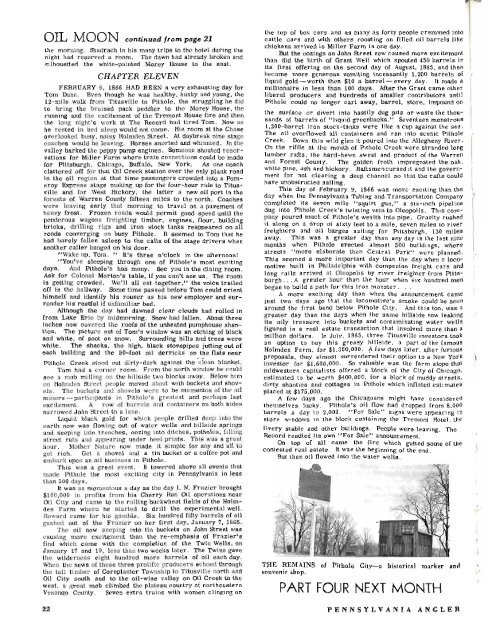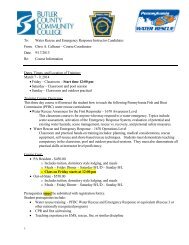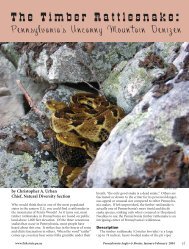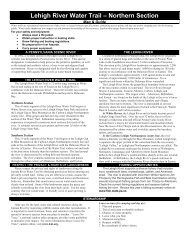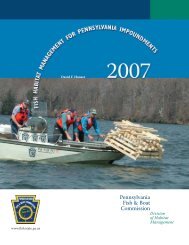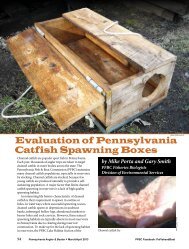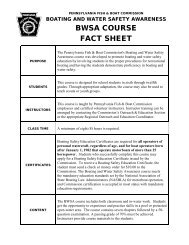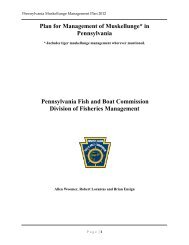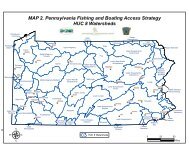march, 1968 - Pennsylvania Fish and Boat Commission
march, 1968 - Pennsylvania Fish and Boat Commission
march, 1968 - Pennsylvania Fish and Boat Commission
You also want an ePaper? Increase the reach of your titles
YUMPU automatically turns print PDFs into web optimized ePapers that Google loves.
OIL MOON continued from page 21<br />
the morning. Shadrach in his many trips to the hotel during the<br />
night had reserved a room. The dawn had already broken <strong>and</strong><br />
silhouetted the white-painted Morey House to the east.<br />
CHAPTER ELEVEN<br />
FEBRUARY 8, 1866 HAD BEEN a very exhausting day for<br />
Tom Dunn. Even though he was healthy, husky <strong>and</strong> young, the<br />
12-mile walk from Titusville to Pithole, the struggling he did<br />
to bring the bruised pack peddler to the Morey House, the<br />
running <strong>and</strong> the excitement of the Tremont House fire <strong>and</strong> then<br />
the long night's work at The Record had tired Tom. Now as<br />
he rested in bed sleep would not come. His room at the Chase<br />
overlooked busy, noisy Holmden Street. At daybreak nine stage<br />
coaches would be leaving. Horses snorted <strong>and</strong> whinnied. Jn the<br />
valley barked the peppy pump engines. Someone shouted reservations<br />
for Miller Farm where train connections could be made<br />
for Pittsburgh, Chicago, Buffalo, New York. As one coach<br />
clattered off for that Oil Creek station over the only plank road<br />
in the oil region at that time passengers crowded into a Pomeroy<br />
Express stage making up for the four-hour ride to Titusville<br />
<strong>and</strong> for West Hickory, the latter a new oil port in the<br />
forests of Warren County fifteen miles to the north. Coaches<br />
were leaving early that morning to travel on a pavement of<br />
heavy frost. Frozen roads would permit good speed until the<br />
ponderous wagons freighting timber, engines, flour, building<br />
bricks, drilling rigs <strong>and</strong> iron stock tanks reappeared on all<br />
roads converging on busy Pithole. It seemed to Tom that he<br />
had barely fallen asleep to the calls of the stage drivers when<br />
another caller banged on his door.<br />
"Wake up, Tom. " It's three o'clock in the afternoon]<br />
"You've sleeping through one of Pithole's most exciting<br />
days. And Pithole's has many. See you in the dining room.<br />
Ask for Colonel Morton's table, if you can't see us. The room<br />
is getting crowded. We'll all eat together," the voice trailed<br />
off in the hallway. Some time passed before Tom could orient<br />
himself <strong>and</strong> identify his rouser as his new employer <strong>and</strong> surrender<br />
his restful if unfamiliar bed.<br />
Although the day had dawned clear clouds had rolled in<br />
from Lake Erie by midmorning. Snow had fallen. About three<br />
inches now covered the roofs of the unheated pumphouse shanties.<br />
The picture out of Tom's window was an etching of black<br />
<strong>and</strong> white, of soot on snow. Surrounding hills <strong>and</strong> trees were<br />
white. The shacks, the high, black stovepipes jutting out of<br />
each building <strong>and</strong> the 50-foot oil derricks on the flats near<br />
Pithole Creek stood out dirty-dark against the clean blanket.<br />
Tom had a corner room. From the north window he could<br />
see a mob milling on the hillside two blocks away. Below him<br />
on Holmden Street people moved about with buckets <strong>and</strong> shovels.<br />
The buckets <strong>and</strong> shovels were to be mementos of the oil<br />
miners — participants in Pithole's greatest <strong>and</strong> perhaps last<br />
excitement. A row of barrels <strong>and</strong> containers on both sides<br />
narrowed John Street to a lane.<br />
Liquid black gold for which people drilled deep into the<br />
earth now was flowing out of water wells <strong>and</strong> hillside springs<br />
<strong>and</strong> seeping into trenches, oozing into ditches, potholes, filling<br />
street ruts <strong>and</strong> appearing under heel prints. This was a great<br />
hour. Mother Nature now made it simple for any <strong>and</strong> all to<br />
get rich. Get a shovel <strong>and</strong> a tin bucket or a coffee pot <strong>and</strong><br />
embark upon an oil business in Pithole.<br />
This was a great event. It towered above all events that<br />
made Pithole the most exciting city in <strong>Pennsylvania</strong> in less<br />
than 500 days.<br />
It was as momentous a day as the day I. N. Frazier brought<br />
$100,000 in profits from his Cherry Run Oil operations near<br />
Oil City <strong>and</strong> came to the rolling buckwheat fields of the Holmden<br />
Farm where he started to drill the experimental well.<br />
Reward came for his gamble. Six hundred fifty barrels of oil<br />
gushed out of the Frazier on her first day, January 7, 1865.<br />
The oil now seeping into tin buckets on John Street was<br />
causing more excitement than the re-emphasis of Frazier's<br />
find which came with the completion of the Twin Wells, on<br />
January 17 <strong>and</strong> 19, less than two weeks later. The Twins gave<br />
the wilderness eight hundred more barrels of oil each day.<br />
When the news of these three prolific producers echoed through<br />
the tall timber of Cornplanter Township to Titusville north <strong>and</strong><br />
Oil City south <strong>and</strong> to the oil-wise valley on Oil Creek to the<br />
west, a great mob climbed the plateau country of northeastern<br />
Venango County. Seven extra trains with women clinging on<br />
the top of box cars <strong>and</strong> as many as forty people crammed into<br />
cattle cars <strong>and</strong> with others roosting on filled oil barrels like<br />
chickens arrived in Miller Farm in one day.<br />
But the oozings on John Street now caused more excitement<br />
than did the birth of Grant Well which spouted 450 barrels in<br />
its first offering on the second day of August, 1865, <strong>and</strong> then<br />
became more generous vomiting incessantly 1,200 barrels of<br />
liquid gold — worth then $10 a barrel — every day. It made a<br />
millionaire in less than 100 days. After the Grant came other<br />
liberal producers <strong>and</strong> hundreds of smaller contributors until<br />
Pithole could no longer cart away, barrel, store, impound on<br />
the surface or divert into hastily dug pits or waste the thous<strong>and</strong>s<br />
of barrels of "liquid greenbacks." Seventeen monstrous<br />
1,200-barrel iron stock-tanks were like a cup against the sea.<br />
The oil overflowed all containers <strong>and</strong> ran into scenic Pithole<br />
Creek. Down this wild glen it poured into the Allegheny River.<br />
On the riffle at the mouth of Pithole Creek were str<strong>and</strong>ed long<br />
lumber rafts, the hard-hewn sweat <strong>and</strong> product of the Warren<br />
<strong>and</strong> Forest County. The golden froth impregnated the oak,<br />
white pine, ash <strong>and</strong> hickory. Raftsmen cursed it <strong>and</strong> the government<br />
for not clearing a deep channel so that the rafts could<br />
have unobstructed sailing.<br />
This day of February 9, 1866 was more exciting than the<br />
day when the <strong>Pennsylvania</strong> Tubing <strong>and</strong> Transportation Company<br />
completed its seven mile "squirt gun," a six-inch pipeline<br />
dug into Pithole Creek's twisting vein to Oleopolis. This company<br />
poured much of Pithole's wealth into pipe. Gravity rushed<br />
it along on a drop of sixty feet to a mile, seven miles to river<br />
freighters <strong>and</strong> oil barges sailing for Pittsburgh, 130 miles<br />
away. This was a greater day than any day in the last nine<br />
months when Pithole erected almost 500 buildings, where<br />
streets "more elaborate than Central Park" were planned.<br />
This seemed a more important day than the day when a locomotive<br />
built in Philadelphia with companion freight cars <strong>and</strong><br />
long rails arrived at Oleopolis by river freighter from Pittsburgh<br />
... A greater hour than the hour when six hundred men<br />
began to build a path for this iron monster ....<br />
A more exciting day than when the announcement came<br />
just two days ago that the locomotive's smoke could be seen<br />
around the first bend below Pithole City. And this too, was a<br />
greater day than the days when the same hillside now leaking<br />
its oily treasure into buckets <strong>and</strong> contaminating water wells<br />
figured in a real estate transaction that involved more than a<br />
million dollars. In July, 1865, three Titusville investors took<br />
an option to buy this greasy hillside, a part of the famous<br />
Holmden Farm, for $1,300,000. A few days later, after furious<br />
proposals, they almost surrendered their option to a New York i<br />
investor for $1,600,000. So valuable was the farm slope that<br />
midwestern capitalists offered a block of the City of Chicago,<br />
estimated to be worth $400,000, for a block of muddy streets,<br />
dirty shanties <strong>and</strong> cottages in Pithole which inflated estimates<br />
placed at $175,000.<br />
A few days ago the Chicagoans might have considered<br />
themselves lucky. Pithole's oil flow had dropped from 8,000<br />
barrels a day to 2,000. "For Sale" signs were appearing in<br />
store windows in the block containing the Tremont Hotel, the<br />
livery stable <strong>and</strong> other buildings. People were leaving. The<br />
Record readied its own "For Sale" announcement.<br />
On top of all came the fire which gutted some of the<br />
contested real estate. It was the beginning of the end.<br />
But then oil flowed into the water wells.<br />
THE REMAINS of Pithole City—a historical marker <strong>and</strong><br />
souvenir shop.<br />
PART FOUR NEXT MONTH<br />
22 PENNSYLVANIA ANGLER


